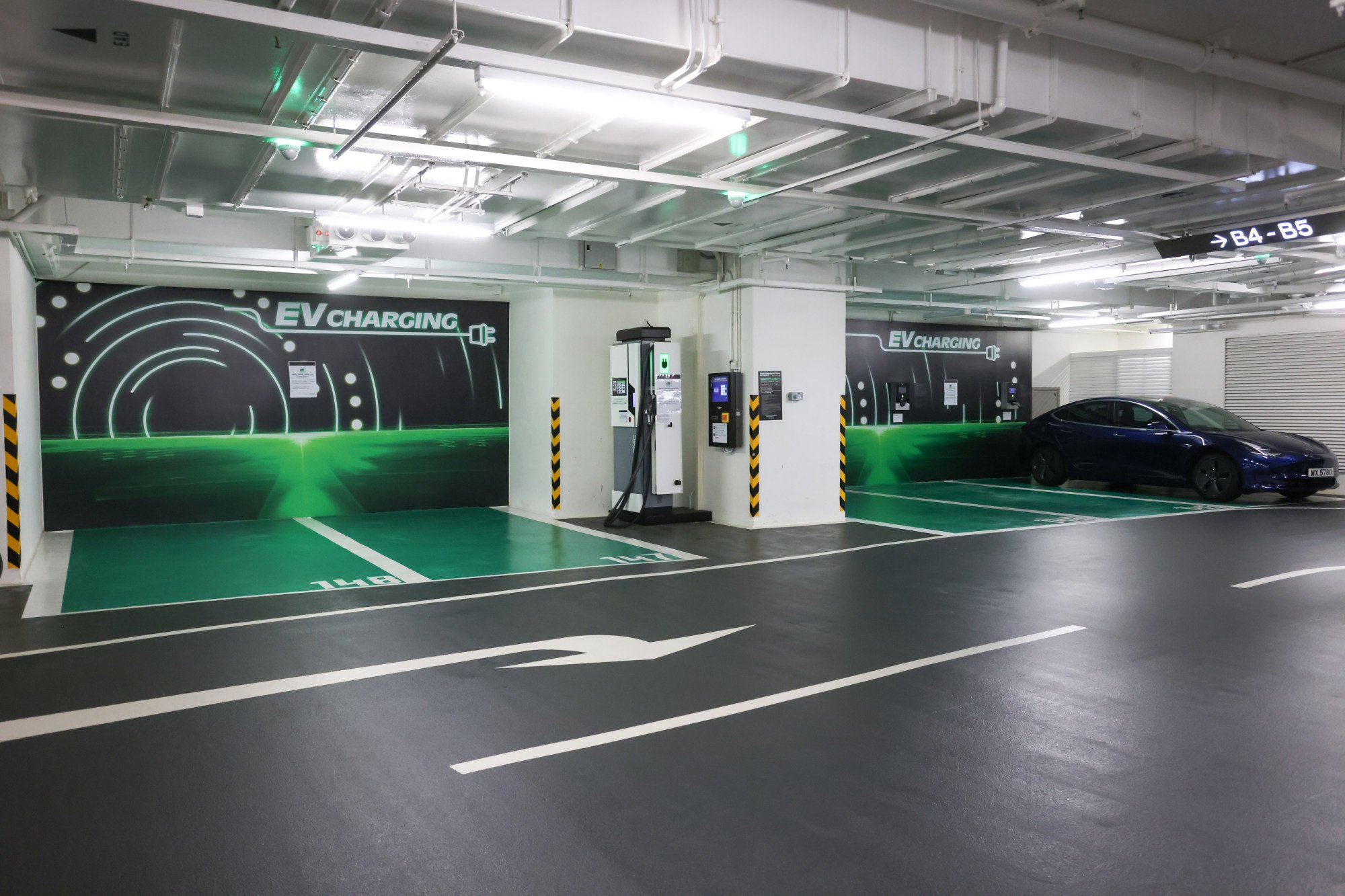
Hong Kong to pull plug on free EV charging at government facilities from second half of year
- Phased introduction of fees planned, with authorities saying new charge will ensure ‘sustainable development’ of service
- Lawmaker Ben Chan suggests HK$2 per kWh fee for electric vehicle drivers using facilities in government car parks
Hong Kong drivers will soon have to pay to use electric vehicle (EV) charging stations at government car parks, authorities have said, explaining the move will ensure the “sustainable development” of the service.
But an industry representative on Tuesday urged the government to keep the price low, while a lawmaker called on authorities to set the rate at HK$2 (25 US cents) per kilowatt-hour.
The pair were responding to a paper submitted to the Legislative Council on Monday, in which the government pledged to provide an additional 7,000 parking spots with EV chargers on its premises as part of its efforts to reduce carbon emissions and phase out private gas-powered and hybrid cars.

As of September 2022, the city had about 5,300 EV chargers. About 2,200 are located at government facilities and are free to use. But that will change from the second half of this year when drivers will have to pay at certain government car parks. The fees will be in place at all government facilities by the end of 2025.
In the private sector, the city’s two electricity suppliers – HK Electric and CLP Power – operate facilities free of charge for residents. However, CLP Power said it would charge EV drivers from next year, while HK Electric has not yet revealed whether it would do the same.
The Environment and Ecology Bureau said authorities would install the new self-service kiosks at government car parks in phases.
“EV charging fees will be imposed in government car parks starting from 2025 to marketise EV charging services, so as to promote their sustainable development in the long-run,” it said in the paper.
Hong Kong records ‘historic increase’ in sales of electric private cars
Other measures mentioned in the paper include testing hydrogen fuel cell buses and heavy vehicles in 2023, as well as electric ferries by 2024. Authorities would also conduct trials for at least 180 electric commercial vehicles and introduce about 700 electric buses and 3,000 electric taxis by 2027.
The chargers will be added to all new government buildings, supplying power to private cars, motorcycles and light goods vehicles.
A car park in Kwai Fong, managed by the Transport Department, will be the first to introduce the self-service kiosks.
But it is unclear how much users will have to pay. Lawmaker Ben Chan Han-pan, president of Legco’s transport panel, suggested the rate be set at about HK$2 per kWh to recover costs.

Most EV models require between 35 and 60kWh to achieve a full charge. Under Chan’s suggestion, it could cost an average driver HK$70 to HK$120 to charge their EV fully.
Drivers in the United States can pay anywhere between the equivalent of HK$39 and HK$78 for a full charge. Although fees can vary widely depending on charging speeds, power supply, electricity prices, location and vehicle model.
Ringo Lee Yiu-pui, president of the Hong Kong Automobile Association, said some commercial car parks added extra fees for EV drivers to prevent them from abusing parking slots with charging facilities.
He said that while he was aware of the rationale behind the policy, authorities should charge just enough to cover their costs, so that drivers were not put off from purchasing the vehicles.
Hong Kong tax breaks fuel big switch to electric cars, but where to charge them?
“Many car owners find it disturbing there aren’t enough charging places,” Lee said. “The government should install more rapid charging stations and charge those people leaving their cars for too long at a higher rate.”
According to the Climate Action Plan unveiled in 2021, Hong Kong authorities aim to cut carbon emissions by half of levels in 2005 before 2035 and attain carbon neutrality by 2050.
In last year’s policy address, Chief Executive John Lee Ka-chiu said the government would cease registering new fuel‑propelled and hybrid private cars in 2035 or earlier.
Tax breaks introduced in 2018 have been a big pull for Hongkongers switching to EVs, and Tesla has remained well ahead of its competitors by providing customers ample charging points.
Hong Kong set to give e-scooters green light in trial scheme covering 2 areas
More than half of newly registered private cars were EVs last year, comprising 19,795 vehicles. Out of the 8,454 EVs registered in October last year, 7,252 were Tesla cars.
Secretary for Environment and Ecology Tse Chin-wan last week said the measures taken so far had begun to yield results.
“We will continue to devote resources to promote trials and adoption of various electric modes of transport, including buses, light buses, taxis, goods vehicles and ferries,” he told lawmakers.
Lawmaker Gary Chan Hak-kan said Tesla had already installed charging stops in Hong Kong, so the government should instead introduce more stations for other brands.
“The commercial decision by other brands not to build charging stops themselves has led to poor sales of such vehicles,” he said. “Charging is the primary consideration when buying an electric car.”
